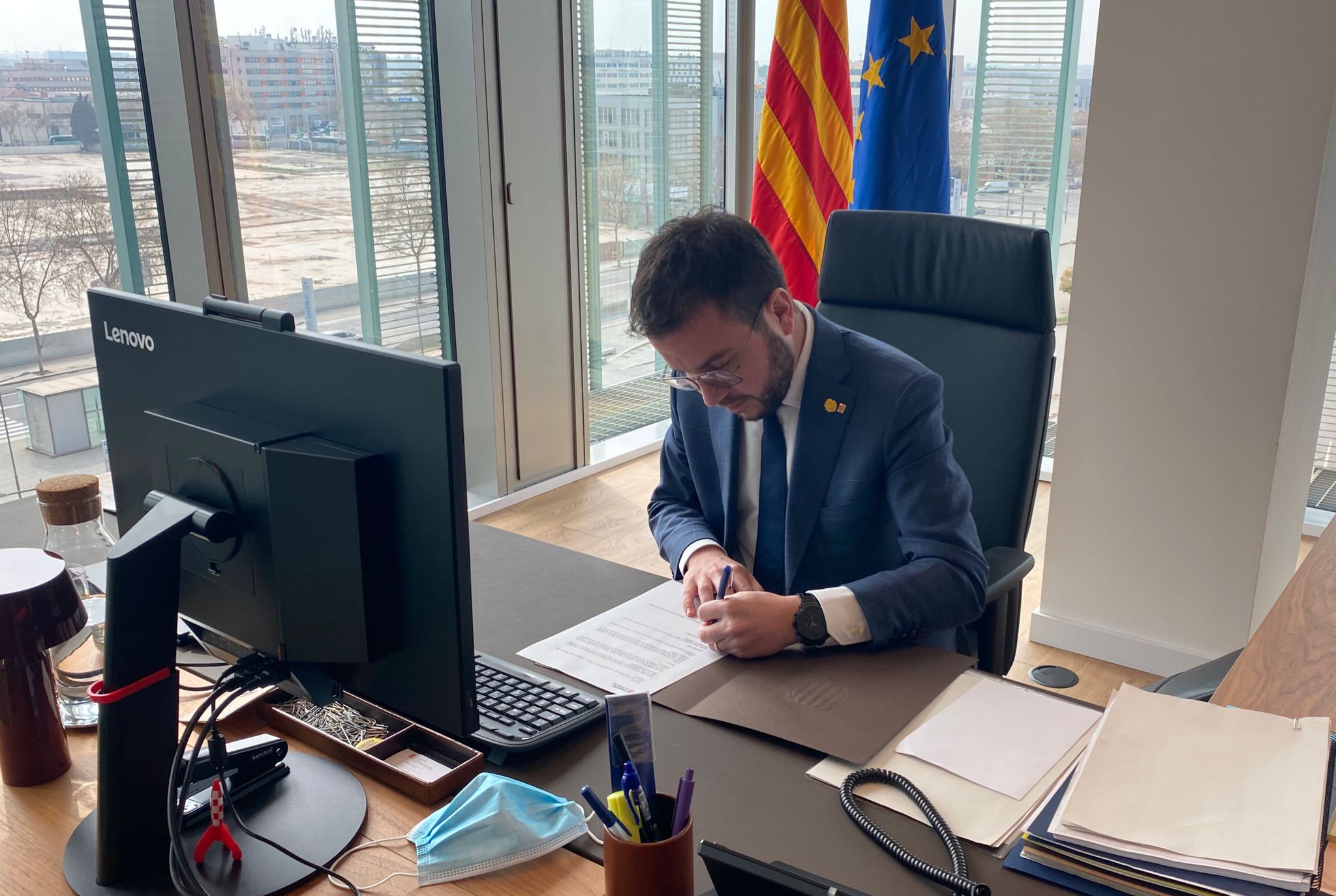The stagnation of talks with Junts and the assembly-based decision-making of the CUP - which needs time to listen to the opinions of its grass-roots membership - have forced the man in the driver's seat, ERC's Pere Aragonès, to extend the negotiation period for the formation of the new Catalan administration for the maximum time allowed following the February 14th elections. The law stipulates that at the latest the new Catalan Parliament must be constituted twenty working days after election day. And so it will be. In the end, Aragonès - incumbent vice president and the only clear candidate to lead the next government - has ruled out ERC’s initial intention to close a deal before the legally stipulated time runs out. This morning, though, he signed the decree calling the constituent session of Parliament for March 12th at 10 am.
Vice president Aragonés signed the decree, in substitution for the judicially-removed president, Quim Torra. He had previously communicated to the candidacy list leaders of all parliamentary forces, except Vox, the chosen date. As the only candidate with real options to obtain the necessary support to be president, Aragonès's intention is to reach an overall agreement on the constitution of the chamber, incorporating the distribution of places in Parliament's procedural Bureau, the investiture, the government pact and even the 2021 budget: a titanic feat.
The battle for the speaker's seat
In exactly one week, then, the first great unknown of the legislature will be resolved: who will end up assuming the position of parliamentary speaker, the second-ranked political authority figure in Catalonia? During the constituent session, Catalan MPs will select the seven members of the Bureau, including the speaker, a role over which Junts, the CUP and the Socialists of the PSC have expressed aspirations.
If the pro-independence groups do not self-destruct in their efforts to reach an accord, their majority of 74 seats in the chamber means that the role is bound to go to a pro-independence party. However, if ERC and the CUP insist on opting for a member of the latter party for the role, and Junts were to reject this agreement and propose their own candidacy, the disagreement could allow the PSC to slip through the middle, with its candidate for the position being the number two on the party list, Eva Granados.
Cordon sanitaire against Vox
As for the other seats on the Bureau, the distribution usually gives two seats to each of the three largest parliamentary groups, in this case PSC, ERC and Junts. The last seat is usually for the fourth largest party in the chamber. Since in this case it is Vox, and all parties except Ciudadanos and the PP have agreed to establish a cordon sanitaire to keep the far right from having institutional power, it is assumed that they will block the entry of Vox to the parliamentary governing body. This would mean that the CUP, the next most represented group, would be able to obtain a seat on the Bureau for the first time in its history.
The law stipulates that in the ten working days following the constitution of the Parliament, the first investiture session will be held, aimed at voting in a new president who will then form a government. Wtih the role of speaker allocated, this newly appointed officer will open a round of consultations with all the parties to find out who has possibilities of winning the required parliamentary approval. Two candidates will step forward to seek a vote, a scenario unheard of before now in Catalonia. One, the leader of the party which finished first in the election, Salvador Illa of the PSC, who despite only having the support of the 33 Catalan Socialists deputies, wants to try his luck - the opposite course to that taken in 2017 by Inés Arrimadas of Cs, who finished first on election night but did not seek the presidency. The second candidate, ERC's Aragonès, is currently working against the electoral clock to secure the necessary votes.
On Thursday this week, the ERC leader was still insisting on a grand alliance of four parties: ERC, Junts , the CUP and the Comuns, which would constitute an ample majority, with 82 seats in the 135 member house. This wish - for what he calls a “3-O Government”, referring to the unity expressed on the streets on 3rd October, 2017 - is one which is already largely accepted as impossible. The alternatives are a government pact with Junts alone, but based on the stable and external support of the CUP - and the Comuns if they agree - or an executive composed of the three pro-independence forces. That is, ERC and Junts as in the last legislature, but also including the CUP in the government. The anti-capitalists are starting a second round of territorial assemblies this weekend to consider the matter before making a final decision next Wednesday.
Any other option would open a scenario of uncertainty. If the two-ballot vote on the investiture fails, the new Parliament would have two months to find a president and hold a second investiture process. Otherwise, it would be time to repeat elections.
In the main image, Pere Aragonès signs the decree convening the constitution of the Catalan Parliament. / VP

